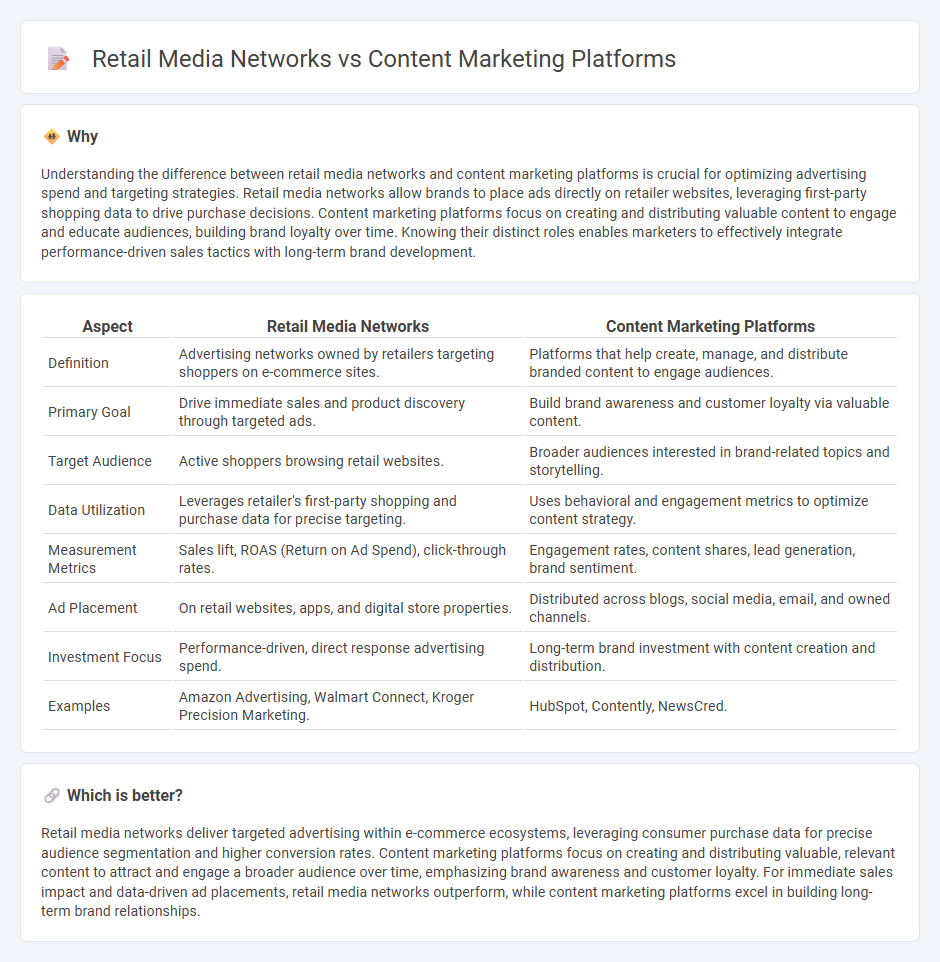
Retail media networks enable brands to advertise directly within retail websites and apps, leveraging consumer purchase data to drive targeted promotions and higher conversion rates. Content marketing platforms focus on creating, distributing, and optimizing branded content across various channels to engage audiences and build brand loyalty. Explore the unique advantages of each approach to maximize your commerce strategy.
Why it is important
Understanding the difference between retail media networks and content marketing platforms is crucial for optimizing advertising spend and targeting strategies. Retail media networks allow brands to place ads directly on retailer websites, leveraging first-party shopping data to drive purchase decisions. Content marketing platforms focus on creating and distributing valuable content to engage and educate audiences, building brand loyalty over time. Knowing their distinct roles enables marketers to effectively integrate performance-driven sales tactics with long-term brand development.
Comparison Table
| Aspect | Retail Media Networks | Content Marketing Platforms |
|---|---|---|
| Definition | Advertising networks owned by retailers targeting shoppers on e-commerce sites. | Platforms that help create, manage, and distribute branded content to engage audiences. |
| Primary Goal | Drive immediate sales and product discovery through targeted ads. | Build brand awareness and customer loyalty via valuable content. |
| Target Audience | Active shoppers browsing retail websites. | Broader audiences interested in brand-related topics and storytelling. |
| Data Utilization | Leverages retailer's first-party shopping and purchase data for precise targeting. | Uses behavioral and engagement metrics to optimize content strategy. |
| Measurement Metrics | Sales lift, ROAS (Return on Ad Spend), click-through rates. | Engagement rates, content shares, lead generation, brand sentiment. |
| Ad Placement | On retail websites, apps, and digital store properties. | Distributed across blogs, social media, email, and owned channels. |
| Investment Focus | Performance-driven, direct response advertising spend. | Long-term brand investment with content creation and distribution. |
| Examples | Amazon Advertising, Walmart Connect, Kroger Precision Marketing. | HubSpot, Contently, NewsCred. |
Which is better?
Retail media networks deliver targeted advertising within e-commerce ecosystems, leveraging consumer purchase data for precise audience segmentation and higher conversion rates. Content marketing platforms focus on creating and distributing valuable, relevant content to attract and engage a broader audience over time, emphasizing brand awareness and customer loyalty. For immediate sales impact and data-driven ad placements, retail media networks outperform, while content marketing platforms excel in building long-term brand relationships.
Connection
Retail media networks leverage shopper data and online retail environments to deliver targeted advertisements, enhancing customer engagement and driving sales. Content marketing platforms enable brands to create, distribute, and optimize relevant content that aligns with consumer interests in these retail spaces. Together, they create a seamless ecosystem where personalized advertising and valuable content work synergistically to boost conversion rates and maximize return on investment in commerce.
Key Terms
Sponsored Content
Sponsored content in content marketing platforms targets engaged audiences through native advertising, blending seamlessly with editorial material to enhance brand storytelling and customer trust. Retail media networks leverage first-party retail data to deliver highly personalized sponsored content directly within e-commerce environments, driving conversions at the point of purchase. Explore how combining these approaches can maximize your brand's visibility and sales.
Native Advertising
Content marketing platforms offer advanced tools for creating and distributing native advertising seamlessly within editorial content, enhancing engagement and brand storytelling. Retail media networks leverage shopper intent data and in-store insights to deliver highly targeted native ads across e-commerce sites and retail apps, driving conversion through contextual relevance. Explore how each approach maximizes ROI and elevates native advertising effectiveness in your digital strategy.
Shoppable Ads
Content marketing platforms streamline the creation and distribution of Shoppable Ads, enabling brands to directly link products within engaging content across multiple channels. Retail media networks leverage first-party retail data to target shoppers with personalized Shoppable Ads on retailer websites and apps, driving immediate purchase intent. Explore how these two approaches enhance consumer engagement and conversion through Shoppable Ads.
Source and External Links
Content Marketing Platforms: Top Picks for 2025 - StoryChief - This article highlights leading content marketing platforms like StoryChief, HubSpot, and Contently, detailing their features such as content creation, SEO tools, marketing automation, content workflow management, and analytics aimed at streamlining content marketing efforts.
Best Content Marketing Platforms Reviews 2025 - Gartner - Gartner provides expert reviews of top content marketing platforms including HubSpot Content Hub, Mintent, and Brafton, focusing on their capabilities in strategy development, SEO, email marketing, content creation, and analytics across various industries.
Content Marketing Platform | Brafton - Brafton's CMP optimizes content marketing workflow with features like digital asset management, content calendar management, production planning, resource tracking, campaign measurement, and robust analytics for performance insights.
 dowidth.com
dowidth.com